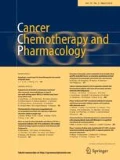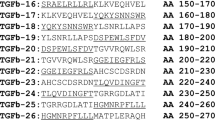Abstract
Recent human tumor immunology research has identified several genes coding immunogenic peptides recognized by CD8 cytotoxic T lymphocytes (CTLs) in melanoma tumors. Very recently, CD4 T cell antigenic epitopes were also determined in certain melanoma tumors. The use of these peptides in conjunction with human immunotherapy could prove to be of great benefit. However, such peptides in clinically common tumors of epithelial cell origin, such as of the stomach, colon, lung, etc., have not yet been determined extensively. We describe for the first time an HLA-A31 (A*31012)-restricted natural antigenic peptide recognized by the CD8 CTL TcHST-2 of gastric signet ring cell carcinoma cell line HST-2. We also identified the HLA-DRB1*08032-restricted peptide recognized by the CD4 T cell line TcOSC-20 of squamous cell carcinoma OSC-20 derived from the oral cavity. The antigenic peptide of HST-2, designated F4.2, is composed of 10 amino acid residues with two anchor motif residues necessary for binding to HLA-A31 molecules. The synthetic F4.2 peptide enhanced the reactivity of TcHST-2 against HST-2 cells. Furthermore, introduction of an expression minigene coding F4.2 peptide to HLA-A31(+) cells conferred cytotoxic susceptibility to TcHST-2 on the cells. Some stomach cancer lines into which the HLA-A31 gene had been introduced, such as MKN28-A31-2, were lysed by TcHST-2, suggesting the presence of F4.2 peptide in at least some HLA-A31(+) stomach cancers. Furthermore, F4.2 peptide induced an F4.2 peptide-specific CTL response in at least 30–40% of HLA-A31(+) peripheral blood lymphocytes from gastric cancer patients, suggesting that F4.2 peptide could be used as a cancer vaccine for gastric tumors. The natural antigenic peptide of OSC-20 was also determined using acid extraction and biochemical separation and by mass spectrometry. Consequently, OSC-20 peptide was designated as the 6-1-5 peptide, an HLA-DRB1*08032-restricted 16-mer peptide with two possible anchor motifs. It has an amino acid sequence identical to that of human α-enolase, suggesting that it was derived from the processed parental α-enolase protein. We are presently attempting to determine the genes that code tumor rejection antigens recognized by HLA-A24- and A26-restricted T cells, including those of pulmonary and pancreatic carcinomas. The search for these antigenic peptides may lead to the identification of immunogenic peptide antigens that would be suitable for clinical use in commonly occurring epithelial cancers.
Similar content being viewed by others
Author information
Authors and Affiliations
Rights and permissions
About this article
Cite this article
Sato, N., Nabeta, Y., Kondo, H. et al. Human CD8 and CD4 T cell epitopes of epithelial cancer antigens. Cancer Chemother Pharmacol 46 (Suppl 1), S86–S90 (2000). https://doi.org/10.1007/PL00014057
Issue Date:
DOI: https://doi.org/10.1007/PL00014057




